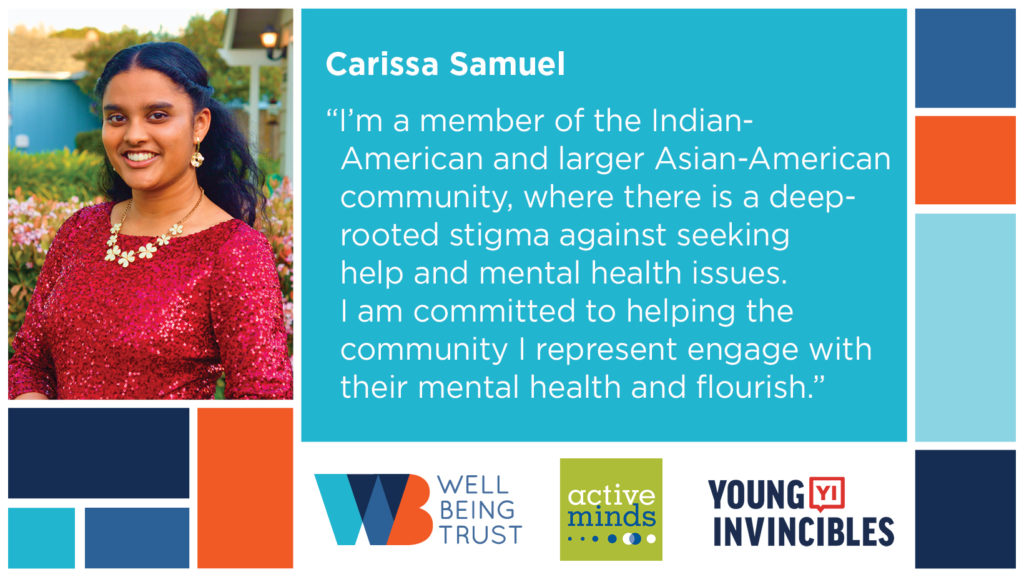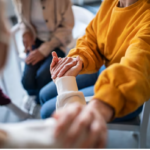“There is an Indian proverb that says, ‘If you conquer your mind, you conquer the world.’ I truly believe that if we are able to conquer our minds and work toward a better mental health state, that our communities will be much stronger for it.”
– Carissa Samuel
In Tamil, my mother tongue, which is spoken primarily in southern India and Sri Lanka, there is a unique word called ‘urimai’. It requires taking responsibility for someone because they belong to you. It’s a beautiful word of deep community.
My Indian culture has this same heritage. Everything is done in community. Times of celebrating and times of mourning; times of wealth and times of neediness; even times of silence and times of laughter.
I truly believe that dealing with mental health is a community project although we often treat it as an individual issue. When it comes to mental health, one of the best things we can do for ourselves is to stay immersed in community. It is a community that can support us and it’s where we can reach out for help. We do not have to be all alone in our struggles.
However, feelings of isolation and stigma associated with accessing mental health care, especially for many in the BIPOC (Black, Indigenous, People of Color) community, adds an extra burden when it comes dealing with mental health concerns, oftentimes leaving individuals feeling alone with nowhere to turn.
Isolation
Although I have lived in the United States for almost my whole life, my “Indianness” is often still all that people seem to see. I often wish that I could be seen as a person and not just as a brown girl. As a child, I especially disliked not being able to fit in and being brown instead of white. I started to have a personal vendetta against my Indianness, which only seemed to translate into isolation.
It’s not just me. This isolation is very common among BIPOC communities. Often, these communities are in spaces where everyone around them belongs to the majority culture. So, the minority cultures are, in some cases, ignored and isolated.
Isolation only adds to the other pains that many of these communities face. Along with the mental health needs that are present in every community, this isolation amplifies the struggle making mental wellness so much more important but also seemingly farther away.
Surviving Vs. Thriving
When speaking of positive mental health, the words flourishing and thriving are often used. They describe the ideal state of wellness. However, thriving is far away from the lives of many BIPOC individuals. This is due to multiple reasons. First of all, across the board, mental health care is viewed as more of a luxury than a need. Secondly, for communities that are already struggling with the tensions of poverty, the strains of immigration and more, dealing with mental health becomes less of a concern.
For some BIPOC communities where surviving may be the main goal, thriving becomes an indulgence they can’t afford – this is a huge barrier to wellness.
Stigma: The Silent Barrier
As a member of the Indian-American and larger Asian-American communities, I have seen first-hand the deep-rooted stigma that some in the Asian-American community have against seeking help for mental health issues. This stigma is prevalent in many cultures around the world and is amplified within Asian-American communities. Research studies indicate that Asian-Americans are three times less likely to seek mental health services than Whites living in the United States.
Moving forward: Is urimai the Missing Factor?
I have come to believe that moving forward requires urimai. It requires each of us caring about the communities around us to the point of being there for each other. We must start being more accepting of each other and form communities where we do not isolate each other, but rather only incorporate each other into our lives. We must defeat the luxury mindset by making our minds and bodies a priority within our communities along with helping those in our communities survive and thrive. We must speak up about our struggles and break down stigma, one conversation at a time. Openly talking about struggles is one of the best ways to address stigma and to start the process of dealing with our mental health struggles.
Mental health is not a one-way street where each of us tries to individually “fix” our problems and “clean up” our acts. Instead, it is a two-way street where we learn from every individual and community and come together stronger to heal and to deal with our struggles.
In the United States, we live in a unique mix of many cultures from around the world. We have the privilege of being able to learn from the cultures around us. For many of us who are in multicultural families, we can even start with the cultures we were born into.
Instead of choosing to only value individuality, we can begin to prioritize community.
Let’s step up and move toward a future of healing as we embrace our struggles on the two-way street to wellness.
Active Minds, Young Invincibles, and Well Being Trust recently welcomed 20 young adults to the National Mental Health Advisory Board. Carissa Samuel is a member of the Advisory Board and a junior studying molecular and cellular biology at the University of California, Berkeley.






